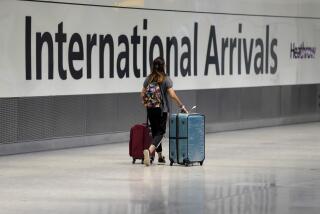Two Contrasting Views of Visits to Russia
- Share via
On Sunday, May 5, my wife and I, American tourists in Moscow, stood at the tomb of Soviet World War II unknown soldier at the same time President Reagan was scheduled to visit the German war cemetery at Bitburg.
Since we arrived in Moscow on May 3, we did not know if Reagan visited Bitburg. And if he did, what was done, but we both felt at that moment that it would have been more appropriate for the President of the United States of America to have visited the tomb of the unknown soldier of our war ally than to have visited the graves of the soldiers of our war enemy. It would have been a statesmanlike gesture of the highest order and would have been a giant step toward allaying the fears of the Soviet people that the United States is bent on their destruction.
May 9 was a nationwide holiday, celebrating the victory of “the Soviet forces over fascism.” It was the 40th anniversary of that victory, and although it is also our (American) victory, the Russians mark this as one of the most important days in their long history. It marks the end of a war in which their land was invaded and occupied, 20 million of their people were killed and one-third of their economy was destroyed.
The city had been scrubbed clean, flags and banners were erected and flowers planted. Our hotel room overlooked Red Square, so we had a close-up view of the festivities. There was a holiday spirit in the air. Everywhere you saw veterans wearing their medals, and children with flowers on their way to the tomb of the unknown soldier. These were not empty gestures of patriotism. Hardly a family in the Soviet Union has not lost someone in the war--approximately one out of every 11 people at the time were killed. We sat at lunch at a table with two Russian women. Each of whom, we were informed, lost a father in the war. As we talked about the war, tears came to their eyes.
Everywhere we went, we heard the same things. The people of the Soviet Union know war at its worst and are determined to work to prevent another. We met people in our profession (architects) and had dinner with a Russian family--and everywhere it’s the same--peace with the United States, peaceful coexistence with the United States. They talk with such conviction, and in such a way that we must believe them. As Americans, we must act in such a way as to convince them that our people also want to live in peace with the Soviet people. The alternative is unthinkable.
SYDNEY H. BRISKER
ESTELLE R. BRISKER
Los Angeles
More to Read
Sign up for Essential California
The most important California stories and recommendations in your inbox every morning.
You may occasionally receive promotional content from the Los Angeles Times.













